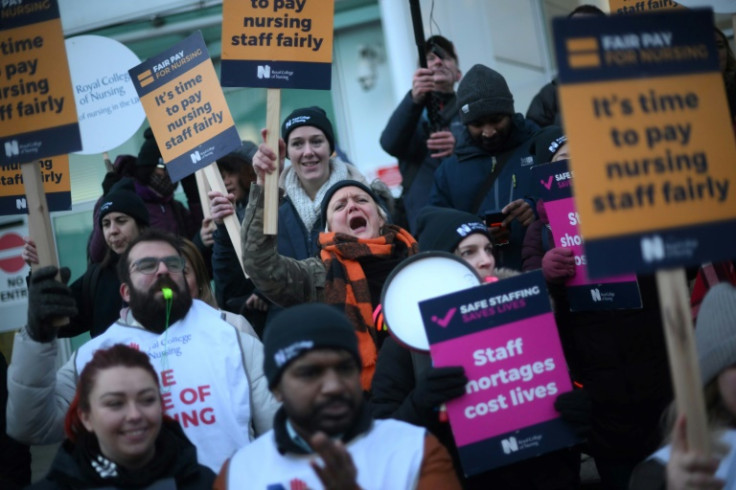Government announces £21 million AI investment for NHS
£21 million will be invested in AI developments across the NHS, the Government announced today. The funding will allow NHS Trusts to accelerate the deployment of the most promising AI tools across hospitals.

The UK government announced £21 million will be invested in artificial intelligence (AI) developments across the NHS.
The funding, which will be made fully available by the end of 2023, will allow NHS Trusts to accelerate the deployment of the most promising AI tools across hospitals, to help treat patients this coming winter.
The announcement comes a day after the Bank of England raised interest rates for the 13th time in a row, to a record 5 per cent, and two weeks before the NHS' 75th birthday.
The service has been increasingly stretched for funding, resources, and staff in recent years, a situation exacerbated by the impact of the Covid-19 global health crisis.
Prior to the pandemic in February 2020, there were already 4.43 million people on a waiting list for care.
At the beginning of the pandemic, the combination of suspension of non-urgent services and changes to individuals' behaviour meant that the number of people joining the waiting list initially dropped.
However, this has since been rising - and despite some improvements earlier in the year, waiting times remain far higher than pre-COVID.
The latest figures for April 2023 show that around 7.42 million people waiting for treatment, a slight increase on the previous month; nearly 3.09 million of these patients waiting over 18 weeks, and around 371,000 of these patients waiting over a year for treatment – which is around 292 times as many as in March 2019, before the pandemic began.
This worrying backlog has coincided with a national cost-of-living crisis, putting further strain on the national health service.
However, the new ring-fenced funds represent a lifeline.
Since AI exploded into mainstream news with the creation of ChatGPT in November 2022, the technology has developed rapidly as industries race to develop their own versions of the software.
According to the latest available data, ChatGPT currently has over 100 million users, and the website generates one billion visitors per month.
While the artificial intelligence software has been lauded for its ability to instantly produce advanced text such as essays, poems, and stories, it has also sparked worry about misinformation and data leaks.
And concern over the rapid speed of development in the field over recent months has led a group of scientists, as well as several high-profile figures in the technology industry, to sign an open letter calling for a 6-month delay for all AI enterprises, to allow time for legislation to catch up with advancements in the field.
Global leaders should be working to reduce "the risk of extinction" from artificial intelligence technology, a group of industry chiefs and experts warned last month.
UK Prime Minister Rishi Sunak though, has indicated he is a big fan of the technology, despite acknowledging its dangers if not properly regulated.
Speaking at the London Tech Event last week, Sunak expressed excitement at the possibility of AI transforming the education sector.
He said it was one of the public services he was most excited about AI's potential to impact, adding the technology could "reduce teachers' workloads" by assisting with lesson planning and marking.
And the National Health Service is the latest beneficiary of government funding to begin integrating AI into its everyday operations.
The new technology will help diagnose patients more quickly for conditions such as cancers, strokes, and heart conditions, by utilising AI imaging and decision support tools.
This includes tools that analyse chest X-rays in suspected cases of lung cancer.
The Health and Social Care Secretary, Steve Barclay, has also committed to rolling out AI stroke-diagnosis technology to 100 per cent of stroke networks by the end of 2023 – up from 86 per cent today – helping thousands of patients suffering from a stroke get treated faster.
According to Barclay, AI tools are "already making a significant impact" across the NHS, through diagnosing conditions earlier.
He says he is now focused on "adopting" the latest cutting-edge technology across the health and care system to "ensure we can continue to deliver the best care for our patients and cut waiting times" – one of the government's five priorities.

In December 2022, Rishi Sunak included reducing waiting times as one of his five key pledges for the new year.
However, he has faced criticism in recent weeks after the latest migration figures reached a new high, and again yesterday after the Bank of England raised the interest rate.
So the Prime Minister will be keen to deliver on his goal of cutting hospital waiting times in half during the remainder of the year.
While the government has already invested £123 million into 86 AI technologies, this latest funding is described by the Secretary of State for Science, Innovation, and Technology as a "game-changer".
"Improving diagnosis and speeding up treatments for patients through AI demonstrates how the NHS remains at the cutting edge of modern-day technology and innovation," Chloe Smith said.
The news has also been welcomed by those within the National Health Service.
Dr Katharine Halliday, President of the Royal College of Radiologists, said there is huge promise in AI, as it could "save clinicians time by maximising our efficiency, supporting our decision-making, and helping identify and prioritise the most urgent cases".
The new funding package comes after NHS England's chief executive Amanda Pritchard anticipated that further applications for AI in the health service were on the horizon.
She told delegates at the 2023 NHS ConfedExpo: "As a national health service, we are in a prime position to be able to make this technology available quickly. And our national commercial powers make us well placed to get the best deal for taxpayers."
© Copyright IBTimes 2025. All rights reserved.






















